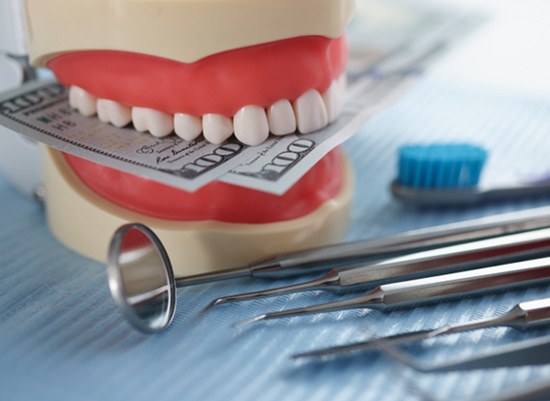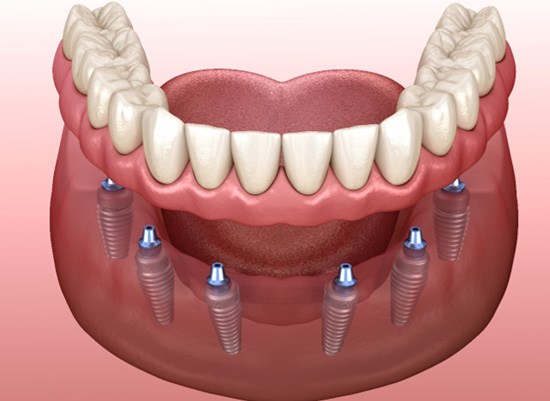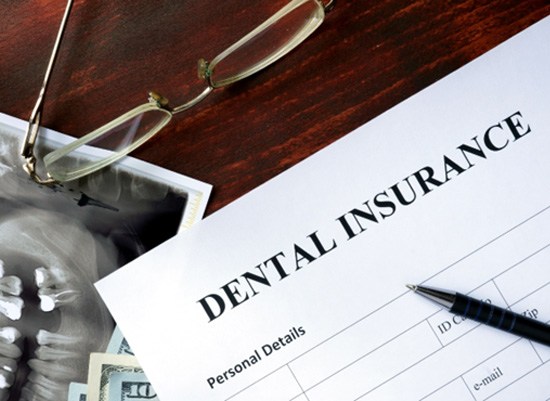Dentures – Houston, TX
The Tried-and-True Solution to Tooth Loss
When you have one or more missing teeth, there isn’t only your appearance to consider—although that is of course very important. After all, the way your smile appears to others can have a dramatic impact on you psychologically and emotionally. Beyond this, however, there are also the consequences to your oral and general health. Did you know that just one missing tooth increases the risk of gum disease and tooth decay? Read below for more info on dentures from our Houston, TX dentist.

Why Choose Sunrise Dental Center for Dentures?
- High-Quality Dental Materials Used
- Caring & Judgment-Free Dentistry
- We Accept Dental Insurance
Full Dentures

A full denture is intended to replace all of the teeth along your upper arch, your lower arch, or both. False teeth are mounted on a base designed to look like your gums. We take precise measurements of your mouth so our lab can create dentures that fit and that are attractive on you. Your full denture will be held in place by suction and the muscles of your tongue and cheeks. For additional security, many people apply a denture adhesive to the underside of the base.
Partial Dentures

Of course, there are many people who are missing only some of their teeth. In this case, your dentist will design a partial dentures for Houston Heights dental patients. A removable partial denture slips between remaining teeth to fill the gap in your smile. This prosthetic is usually constructed on a metal frame and is held in place with clips or brackets that attach to nearby teeth.
Dentures Aftercare

As with any other dental prosthetic and even natural teeth, your dentures will require daily maintenance. Otherwise, harmful plaque and bacteria can stick to your dentures and infect your gums, harming your oral and overall health. With proper care, dentures and partials can give you something to smile about for a long time. In other words, the better you care for your dentures, the more you can laugh, eat, and smile!
Removable Dentures
If you have the capability of removing your partial or full dentures, maintenance will look different than taking care of your natural teeth. You must follow these special instructions to keep your dentures feeling and looking their best for as much time as possible.
Remove After Eating
Often, little bits of food can become trapped between dentures and gums. Not only can this cause discomfort and irritation, but it can also allow microscopic bacteria to grow near your gum tissue. When you’ve finished eating, visit the restroom, take your dentures out, and rinse them off before putting them back in. You’ll feel much more comfortable and also know that your prosthetic teeth are clean and debris free.
Clean Your Restoration
A full denture or a partial requires some special hygienic attention. Just like natural teeth and gums, false teeth and the base of your dentures need to be cleaned daily. Use a soft denture brush and denture cleaner—toothpaste and a regular toothbrush can scratch dentures too easily. And don’t forget that you still need to brush your natural teeth and gums, too.
Keep Your Dentures Safe
For dentures, you’ll receive a hard plastic container to put them in while they’re not in use. This protective case will not only help you avoid losing them but also prevent damage, so be sure to use it whenever your dentures aren’t in your mouth.
Remove Dentures When You Sleep
After wearing your dentures all day, your gums and mouth need to have a break from these prosthetics. As tempting as it may be to keep them in even while you sleep, take them out at night when your mouth naturally produces less saliva and bacteria tend to grow the most.
When you’re not wearing your partial or dentures, whether it’s daytime or at night, they need to be kept in lukewarm water or a denture cleaning solution. Air and heat are the enemies of dentures because they can cause warping in the plastic.
Notice Changes
Over time, you may find that your dentures don’t fit as snugly or that they tend to slip a little more than they used to. These small signs indicate that your dentures need to be adjusted or even replaced. Pay attention to anything that feels unusual or different about your dentures and tell us during your regular checkup so that we can always make sure they continue to fit properly and function well for you.
All-on-4 Dentures
In the case of All-on-4 dentures, you don’t have to worry about removing your prosthetic teeth because they are permanently secured in your mouth. Instead, you should brush and floss them just as you would natural teeth. To help keep oral bacteria under control, you may also wish to use antibacterial mouthwash as part of your daily hygiene routine.
Understanding the Cost of Dentures

If you want to get dentures, it makes sense to learn their price first. That’s only natural – you’ll need to know whether you can afford them. Still, the cost of dentures actually varies by patient; you need to see our dentists for an estimate. From there, though, Sunrise Dental will work to make your care more affordable. Our team will even explain dentures’ cost factors and the available payment options. To get the specifics, just keep reading or visit us for a consultation.
Factors That Affect the Cost of Dentures

Our dentists will perform an oral exam when you attend the initial consultation. Besides confirming whether dentures suit you, this step will review the treatment’s pricing factors. These latter elements typically include:
- Prep Work Needs – If your mouth needs prepping for dentures, treatment will cost more. (For example, pulling a tooth beforehand will add to the overall expense.)
- Denture Base Material – Depending on the kind used, the acrylic in a denture’s base can cost more or less. Naturally, durable and lifelike types are more expensive.
- Replacement Teeth Quality – Based on the situation, your denture’s artificial teeth will be made of acrylic or porcelain. Acrylic ones are cheaper, but they often wear out quickly. Meanwhile, porcelain types cost more but last longer.
Remember: the cheapest dentures usually aren’t good. These sorts use subpar acrylic, making their bases and teeth fragile. As such, try to choose an effective and high-quality prosthetic!
Are Implant Dentures More Expensive?

To put it simply, yes – implant dentures cost more upfront than regular ones. That said, their heightened price is justified due to their benefits.
For one thing, implant dentures use dental implants. These latter restorations (in contrast with regular dentures or bridges) fuse with your jaw. In doing so, they’ll make your prosthetic secure and permanent; they won’t slip or fall. Even better, their fusion ensures the denture looks and acts natural.
At the same time, implant dentures are an excellent long-term investment. Since their implants last 15-30 years with proper care, their lifespan is greater than typical dentures. That means the need for fewer replacement visits offsets their treatment price.
Does Dental Insurance Cover Dentures?

Typically, dental insurance does cover dentures. Most plans consider these prosthetic teeth a “medically necessary” major procedure. As such, their coverage can extend up to 50% of a denture’s cost.
However, there are occasional exceptions. Your insurance plan may limit its denture coverage. To stay prepared, you’ll want to confirm your benefits before treatment. Our office will even help if you’d like.
Other Options for Making Dentures Affordable

Even if you lack insurance, other ways exist to make dentures affordable. Most notably, dental practices tend to offer a wide range of payment options. With the right one, your dentures can be affordable instead of expensive.
Just look at our own Sunrise Dental. We provide flexible financing via CareCredit, a reputable third-party financier. Through them, we’ll let you pay for dentures in monthly installments. You’d then cover their cost gradually.
As you can see, Sunrise Dental is able and eager to make budget-friendly dentures. Just book a consultation with our office to find out more!
Dentures Frequently Asked Questions

Life with new dentures can be strange at first, but you have the team at Sunrise Dental Center to get you through the initial adjustment process. We’ll listen carefully to your questions and concerns, and we’ll provide the answers you need to get the most out of your new smile. Below are examples of questions that a lot of our patients ask; we hope this addresses some of the issues that might be on your mind, and we invite you to reach out to us if there’s anything we’ve missed.
How long will I need to wait to get dentures after my tooth extraction?
Normally, it takes about six to eight weeks for the mouth to heal and for the dentures to be made. The extra time helps the gums to recover, which allows the dentures to have an improved fit. There are immediate dentures that can be placed on the same day as the extraction, but if you take that option, there won’t be any opportunity to preview the fit, so you might need an adjustment sooner rather than later.
Should I have all my teeth pulled so I can get a denture?
When we have the option of repairing or salvaging a tooth, we will always do so. It’s better to keep your natural smile rather than replace it. But sometimes, an extraction is absolutely necessary. If all or most of the teeth in the upper or lower arch have become decayed or infected, then it’s often better to have them all replaced with a denture than try to pay to have them all repaired. We will always explore all of the available options before definitively deciding to remove your teeth.
What can’t I eat with dentures?
It’s important to remember that with dentures, you can eat many different foods and will enjoy a much more complete diet than you would without teeth. However, it is recommended that you avoid:
- Anything sticky that could pull dentures out of place, i.e. peanut butter and gummy candies.
- Anything with small, hard-to-chew pieces that get stuck in dentures, i.e. popcorn kernels and shelled nuts.
- Hard foods that could break dentures, i.e. nuts, apples, and raw carrot sticks.
- Tough meats that require excessive chewing and put stress on your dentures, i.e. steak and pork chops.
Why do my dentures smell?
Sometimes bacteria get trapped in the different nooks and crannies of your dentures. The space between the dentures and the gums is a particularly likely target if your dentures don’t fit properly. To avoid bad breath:
- Use a specialized cleaner to brush your dentures every day.
- Clean your entire mouth, including your gums, tongue, and cheeks; bacteria can easily build up on these surfaces.
- Soak your dentures in disinfecting solution nightly.
- Rinse your dentures after every meal.
I Need a Checkup & Cleaning I Need a Dentist for My Child I am Concerned About Bleeding Gums I Have a Cavity or Broken Tooth I am Missing One or More Teeth I Want to Enhance My Smile I Want a Straighter Smile I am Scared of the Dentist I am in Pain & Need Help I Need Oral & Maxillofacial Surgery View Our Services

